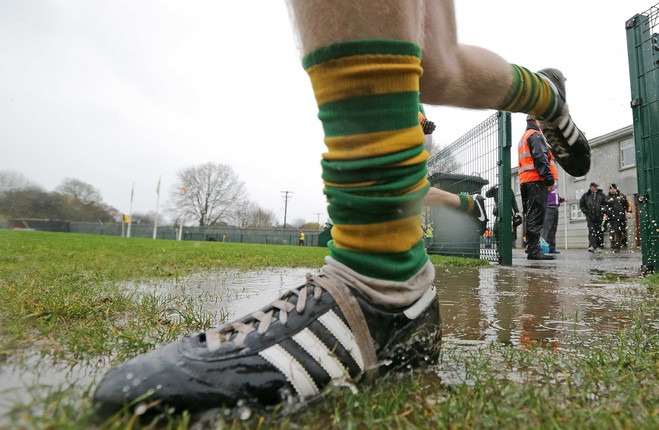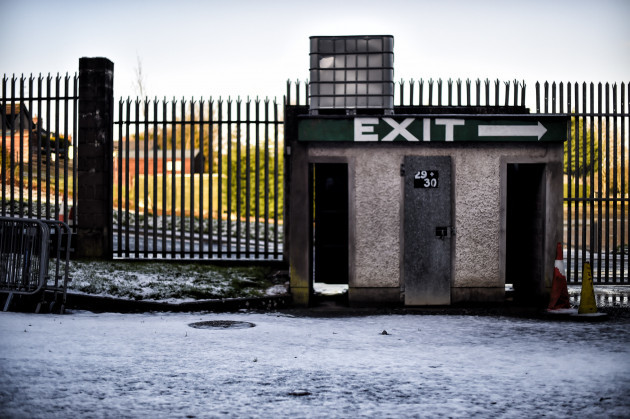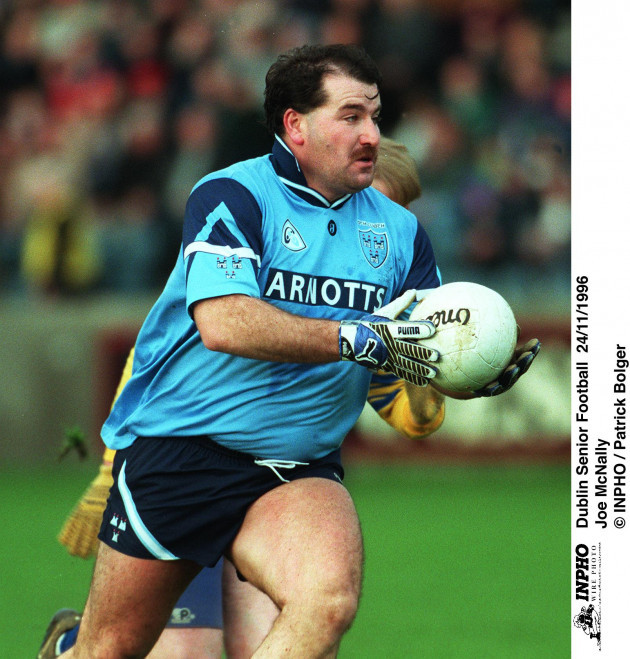I’M SORRY, BUT I just can’t buy all this positivity from the GAA towards the start of the National Football League.
Some of us are old enough to use Google and see the absolute show it tried to make of the league before the poor thing even got going.
The great tragedy about the National Football League is how it was set up to fail.
And yet here it stands in front of us, 99 years later.
Just a League, asking us to love it for what it is. But it won’t mind if you want to close your eyes and think it’s the championship.
It’s just a hunch and all, but we have a theory on why and how the National Football League came into being and was instantly buried in irrelevance.
The year was 1925. Ireland was just trying to stand on her own two feet and all around, optimistic people are trying ambitious things.
Such as the idea for a National League. Sort of.
Patrick Breen of Wexford [Quick diversion on this man right here – he won an All-Ireland football medal for Dublin in 1902, and another one, twelve years later, for Wexford] was the GAA President. Now that is gold-plated LEGACY right there.
But it starts on 7 June, 1925, with a 1-5 to 0-7 win for Roscommon over Leitrim at the Palace Grounds, Strokestown.
Wait for the punchline.
Forty miles away, Cavan are playing Longford in the All-Ireland semi-final in Mullingar.
See? Some fixture-maker along the way didn’t like the idea and treated it mean, to keep it keen.
Boy, did the league keep that end of the deal. It kept going, slammed by rejection at every turn until one day it had just moved in all its’ stuff and we couldn’t imagine life without it.
Back to the origins again. The first editions of the league was a regional competition.
Leinster was spliced three different ways. Four years after partition, Ulster was split once more with Monaghan, Down, Armagh and Antrim forming the North-East group, Cavan, Donegal, Fermanagh and Tyrone being the North-West group.
Derry? Didn’t bother their hole, apparently.
But anyway, they call it the Dr McKenna Cup – YES, THAT ONE! – named after that close friend of the fascist Blueshirt leader, Eoin O’Duffy. If Mickey Harte had been in charge back then, you’d bet your bottom dollar Derry would have been eyeballs out for it.
A digression, surely.
How and ever, the whole enterprise finishes up on 19 September 1926 with Laois beating Dublin 2-1 to 1-0, the brace of goals coming from Jack Brown to make Dick Miller the first winning captain of a National League title.
All despite Paddy Lenihan and Bill Keeley emigrating the week before the final. That’s how much they thought of the league.
Another fixture clash. Of course. This time, the league finals clashed with what, exactly? Some off-Broadway local skirmish?
Nope. It clashed with the Munster hurling final and the classic pairing of Cork and Tipp in Tom Semple’s field.
Cut to the chase: the GAA buried the league in it’s very first staging. It’s been recovering ever since.
Next year marks the centenary. Will they even buy a cake for it? Or just take it for granted, once again?
The league has survived plagues and pandemic and empty stadiums. It has survived World Wars, sponsorship and broadcasting rows and a million disputed handpasses and gulpins shouting STEPS at the top of their lungs, followed soon after by: “No, I will not shut my mouth, you shut your mouth!”
It has suffered rotten weather and the 500 different forms of rain from Ballybofey to Aughrim. And all the while, it’s worth was constantly questioned. Behind its back, right to its face. Nobody seemed to care about it’s feelings. It was drained of feeling. Made complaint. Coercively controlled. We all did it.
What has the league given us?
Well, the obvious one is that it operates for many as a first-rate hangover cure.
It has also gifted us volcanic eruptions such as The Battle of Omagh and thousands of others just like it where you could fire fists into opponents face to draw a marker of sorts and virtually nobody would be truly annoyed by it.
The GAA have also used the league for all sorts of tinkering and experiments. Four quarters of 20 minutes. Fist-passing where your hand to be an actual fist, until they abandoned it after the first couple of weeks.
What has it lost?
The sight of teams heading into a clubhouse was a regular sight in my youth. A couple of quick pints and a bowl of stew to fortify them for the way down the road again.
It’s lost the sheer, unapologetic aplomb of men who had ‘wintered well’, crashing home a few goals just for the craic, like.
And it also has lost the sight of some lads who inexplicably found themselves in a position they knew was miles out of their depth, but curiosity forced them to take a peek all the same.
Like Paul Feeney, who made one appearance for Tyrone in a league game against Dublin in Parnell Park in 2001. A late withdrawal on the day led to him getting an unexpected start.
He missed a goal but put himself about enough and was taken off with 20 minutes to go.
“I caught a serious crack on the stones,” he told the tale a couple of years back.
“I was in the toilet afterwards peeing blood. Eugene (McKenna) walked in and said, ‘You know what kid, you done alright for your first big one.’ I just turned round to him and said, ‘I didn’t think I would get this opportunity, thanks a million.’”
And with that, he never came back. Might only have been just the league, but it was too rich for Feeney’s blood all the same.
We’re not sure how we felt about this next thing, but either way it’s gone too. And that was the playing of three games before Christmas, before resuming after a good long break.
Those pre-Christmas games were perfect studies in apathetic sport. The crowd were mainly there as a means of filling an otherwise empty Sunday.
It’s incredible now to think that the games only moved to the calendar year in 2002. And yet from that point, players have never been more overworked than in those months, now set aside for pre-season.
Conversely, 2002 was the first season TG4 stepped into the breach and they sent interest into orbit from there on.
It’s the best competition in the GAA and it’s also the worst. Well, after the Leinster football championship.
The competition that begins as a sprint, settles into a marathon, and then becomes a slow bike race for those with too many points after round five. If you weren’t careful, you might find yourself winning the bloody thing. And nobody wants that.
But! It is the best because it provides the one thing that sustains anybody in this world: hope.
Without hope, you have nothing.
And this weekend, anyone who is interested in Gaelic football will look at the fixtures and imagine the league table the way they used to be printed before any games even took place. Played 0. Won 0. Draw 0.
Lost 0. That’s unbeaten, so far.
At this stage anything is possible. The winter of rebuilding and loss of established players might – just might – show that there was a whole crew of irreverent punks that were going to take over and have no respect for anyone in their way.
Your record is unblemished. You have hope.
Even if you end up screwing up and not holding your end of the bargain, there will always be someone there to pick you up.
In February 2019, Derry senior football team felt the warm bosom of their North Derry Ultra sect as some comfort.
Shockingly, they were in Division 4 that season and opened the league with wins over Antrim (Belfast) and London (in Ballinascreen).
Round 3 was a 600-mile round trip to Fraher Field to face Waterford.
Some 26 Derry fans turned up. The then-PRO Dermot McPeake produced a sparkling piece of writing about that day in a later programme, detailing every Derry person there and their devotion.
One was the sports writer and excellent blogger [The Warrior’s Code] Steven Doherty, who wrote about the trip: ‘The run to Fraher Field that year was a memorable one. Like so many other Oakleaf families, we’ve followed Derry home and away since childhood and, rather than miles, these days my brother counts away trips by the number of Apple Green service station stops. And there were nearly half a dozen such refuelling stopovers on the bump-free and bucolic road to Waterford.
‘Well-fed and watered by the third pit stop the car’s strict ‘no farting’ policy was being sorely tested. Lines were being crossed and old rivalries threatened to resurface on occasion in the car.’
Derry the football team repaid all those dedicated souls, over and over again.
But if they hadn’t seen such riches, they could live with being poor. The league will always find a home for such waifs and strays.
Cherish it and love it. And let’s set up a WhatsApp group to plan a big birthday party next year.




